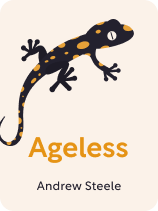

This article is an excerpt from the Shortform book guide to "Ageless" by Andrew Steele. Shortform has the world's best summaries and analyses of books you should be reading.
Like this article? Sign up for a free trial here.
Can aging be prevented? What cautionary measures can you take to live a long and healthy life?
Scientists already have enough evidence to know there are things you can do right now to increase your chances of living a long and healthy life. In Ageless, Andrew Steele points out that we already have evidence that these measures are effective at keeping us fit and healthy as we age.
Continue reading to learn how to prevent aging.
1. Quit Smoking and Stop Living a Sedentary Lifestyle
The first change to make to learn how to prevent aging is quitting if you are currently smoking. Smoking increases your risk of cancer, induces DNA mutations, and causes chronic inflammation linked to cardiovascular disease. Steele explains that while smoking reduces lifespan by 10 years, quitting at age 30 restores life expectancy to normal.
(Shortform note: The consensus is strong: Smoking is one of the most unhealthy habits. While many of us know someone who’s been a lifelong smoker yet is still in good health, experts think such people have very unusual genetics, and nobody should keep smoking. Research also suggests it’s never too late to benefit from stopping smoking.)
A second change that can impact your health is shifting from a sedentary lifestyle to a routine with daily exercise. That change reduces your risk of death and disease, boosts your metabolism, improves the condition of your muscles and bones, and reduces inflammation.
(Shortform note: As Steele explains, regular exercise comes with major health benefits, and decades of studies show that aerobic exercise can lengthen your life. You don’t have to run marathons to benefit, either. In “Blue Zones”—places like Okinawa, Japan and Ikaria, Greece where rates of chronic disease are lower and life expectancies are higher—people naturally exercise by walking to work, climbing stairs, and doing active chores like gardening.)
2. Eat a Balanced Diet, But Skip the Vitamins
Another significant lifestyle choice is your diet. Steele explains that while it’s difficult to conduct rigorous research, the healthiest option seems to be to eat a balanced diet of different foods, without an excess of sugar, fat, or alcohol. Eating less meat and more fruit and vegetables may improve health, according to Steele, and he contends that losing excess weight might reduce your risk of disease. Additionally, he notes that evidence does not support the efficacy of vitamins and supplements (unless you have a nutritional deficiency). Similarly, Steele advises against taking longevity drugs: We don’t yet have evidence that the options available actually work.
| Finding the Right Diet Choosing a healthy diet sounds simple enough, but what does it really entail? A few proven strategies include cutting processed meat, eating dark-colored fruits and vegetables, and skipping processed foods and beverages. Taking a healthy approach to weight can also help: Some experts say that the variations in weight that go with “yo-yo dieting” are worse for your body than maintaining a stable weight. You might shift your focus from losing weight to eating a diet that emphasizes healthy foods (like vegetables, fruits, tree nuts, and yogurt) and limits starchy foods and junk foods (which are high in fat, sugar, or salt but low on healthy nutrients). Additionally, Steele isn’t the only scientist to advise against supplements. In In Defense of Food, Michael Pollan writes that research has shown little to no benefit in taking supplements each day. (Yet Pollan does recommend taking a multivitamin and fish oil after age 50 to offset your body’s declining ability to absorb nutrients.) In How Not to Die, Michael Greger explains that ideally, all of the nutrients your body needs would come from whole foods. There’s one caveat: If you’re eating a plant-based diet, you might need to supplement it. It might be wise to consult with a nutritionist to be sure, as Tim Ferriss advises in The 4-Hour Body. |
3. Brush Your Teeth and Get Enough Sleep
Steele writes that it’s also important to brush your teeth twice daily with fluoride toothpaste and clean between your teeth, which impacts the population of bacteria in your mouth. These bacteria contribute to gum disease and to diseases throughout your body via chronic inflammation.
(Shortform note: Experts agree that your dental health influences the rest of your body, as your mouth is the entry to your digestive and respiratory tracts. The harmful bacteria involved in tooth decay and gum disease contribute to cardiovascular disease and pneumonia.)
Another important lifestyle choice is the amount of sleep you get. Steele writes that sleeping at least seven hours every night, but not more than eight hours, reduces your risk of death and enables your brain to flush out amyloids.
(Shortform note: Experts agree that good sleep is as crucial as diet and exercise. As you sleep, your body repairs damage and your brain flushes out toxins. In Why We Sleep, Matthew Walker explains that your brain also secures memories for long-term recall and clears short-term memory, which prepares you to learn, remember, and concentrate. Experts say adults need seven to nine hours of sleep each night: You might need more than eight hours if your sleep need is higher, you’re catching up on sleep, or you’re sick.)
4. Take Precautions Against Infectious Disease and Watch Your Cardiovascular Health
Evidence is overwhelmingly in favor of taking precautions against infectious disease. Steele advises keeping up with vaccinations, washing your hands, cooking food thoroughly, and staying home if you’re unwell. This can protect you in the short term by preventing infection and in the long term by reducing chronic inflammation.
(Shortform note: Preventing infection is common sense: Nobody wants to spend a week sick in bed nor to develop chronic inflammation or post-viral symptoms. Even common viruses can have debilitating long-term effects. An example is “long Covid,” which increases the risk of heart, lung, liver, and kidney problems or dementia.)
Steele also recommends monitoring your cardiovascular system. He writes that regularly measuring your blood pressure and heart rate can help you keep an eye out for signals you need to lose weight, get more exercise, improve your diet, or talk to your doctor.
(Shortform note: Experts agree that blood pressure and heart rate are two vital signs to watch. Your blood pressure is the force with which your blood pushes against the walls of your arteries. Your heart rate is the number of times your heart beats each minute. Tracking them can help safeguard your health: In Outlive, Peter Attia contends that the key to avoiding decline is to prevent four chronic diseases—heart disease, cancer, neurodegenerative disease, and type 2 diabetes.)
5. Protect Your Skin From Sun Exposure
Finally, Steele advises that you protect your skin from the sun by wearing sunscreen, avoiding exposure when the sun is high, and blocking sunlight with clothing. This prevents the DNA damage that occurs when UV light breaks bonds between molecules. When your body repairs this damage incorrectly, mutations occur and cancer risk increases.
(Shortform note: Experts say UV exposure increases your risk of skin cancer and cataracts, and causes your skin to age prematurely. They estimate that sun exposure is responsible for up to 80% of wrinkles, brown spots, texture changes, and visible blood vessels. Sunscreen slows these signs of aging.)
| An Often-Overlooked Anti-Aging Strategy One proven method for protecting your health as you age that Steele doesn’t mention is maintaining strong relationships with other people. Strong social connections protect your health and can have a profound impact on your longevity. If you have social relationships that help you feel a sense of belonging, those social bonds can prevent serious illnesses, improve your ability to cope with anxiety and depression, and help you to live a healthier lifestyle. As you’re weighing Steele’s recommendations and strategies, it might also help to keep in mind that a healthy lifestyle isn’t an all-or-nothing endeavor. Some experts note that when you’re trying to motivate yourself to make healthier decisions, the aggregate of your choices matters more than trying to behave perfectly. Small decisions accumulate and are significant in the long run. This might be particularly encouraging if you’re impatiently waiting for the high-tech anti-aging advances that Steele describes to materialize: You might not yet be able to pop a pill that promises to help you live to 120, but you can make many smaller decisions that meaningfully impact your chances of living a long and healthy life. |

———End of Preview———
Like what you just read? Read the rest of the world's best book summary and analysis of Andrew Steele's "Ageless" at Shortform.
Here's what you'll find in our full Ageless summary:
- The processes that make us grow sicker and slower as we age
- How future treatments may treat—and even cure—aging
- Proven steps you can take right now to slow your aging process






